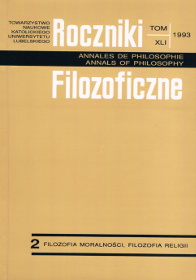Naturalistic Fallacy and Natural Law. Josef Fuchs᾽ Critique of the Thomistic Theory of Natural Law
Abstract
In the paper the author analyzes the critique of the Thomistic theory of natural law put forward by a German theologian Josef Fuchs. The question Fuchs seeks to answer can be formulated as follows: ᾿In what sense nature can be called the basis of morality?᾽ Fuchs distinguishes three possible meanings of the term „nature”:
1) biological structure of man,
2) the specific essence of a given human act (e.g. a sexual act),
3) personal nature of man defined by his freedom and rationality.
According to Fuchs, the Thomistic theory of natural law contains, at least in some of its modes of argumentation, an error called − after G. E. Moore − naturalistic fallacy. It consists in deducing normative conclusions from descriptive premises. Fuchs distinguishes three forms of this error. In the first form, biological laws are taken for moral norms. In the second, normative conclusions are inferred from the description of the specific essence of a given act. The third form of the same error can be called „theological fallacy”: it consists in not distinguishing between God᾽s creative will and God᾽s moral will.
The present paper is focused on the distinction between different forms of the naturalistic fallacy objection. In his next paper the author will investigate to what extent this objection is valid as far as the structure of Thomistic ethics is concerned.
Copyright (c) 1993 Roczniki Filozoficzne

This work is licensed under a Creative Commons Attribution-NonCommercial-NoDerivatives 4.0 International License.





